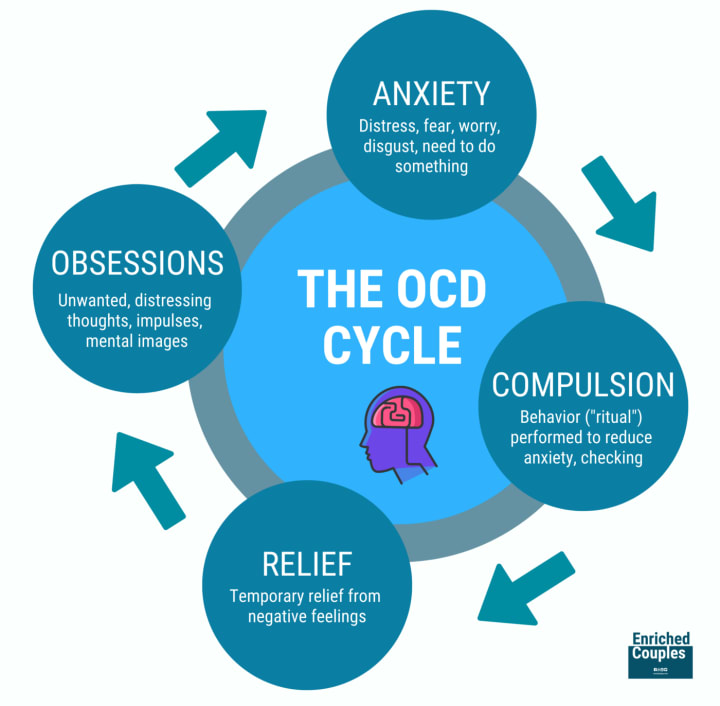How a Bad Mental Health Day Sparked My Medium Journey
Don’t pay OCD’s requested ransom — it is never satiated and always ends up demanding a much higher price.

It was a typical Monday evening. I perched on the window sill with my hands wrapped around my face. I was having a bad day with my OCD — I had managed to stay strong for the entire morning, but I couldn’t take anymore that evening. It is like those Jenga blocks, where one wrong move is enough to tumble down your carefully constructed tower (my tower, in this case, is my resolve to stand up to OCD).
What is OCD?
For those who do not know what OCD is, it stands for ‘Obsessive Compulsive Disorder.’
Obsessive-compulsive disorder (OCD) is a disorder in which people have recurring, unwanted thoughts, ideas, or sensations (obsessions) that make them feel driven to do something repetitively (compulsions).
According to HelpGuide, the OCD process can be treated as a cycle. First, come to the Obsessions — which can be unwanted, distressing thoughts, impulses, urges, or mental images. Obsessions are involuntary thoughts, images, or impulses that occur over and over again in your mind. You don’t want to have these ideas, but you can’t stop them. Unfortunately, these obsessive thoughts are often disturbing and distracting. After the onset of the obsession, is when the anxiety kicks in. You have to perform the compulsion for the anxiety to subside momentarily.
Compulsions are behaviors or rituals that you feel driven to act out again and again. Usually, compulsions are performed in an attempt to make obsessions go away. For example, if you’re afraid of contamination, you might develop elaborate cleaning rituals. However, the relief which you get upon performing the compulsions never lasts. The obsessive thoughts usually come back stronger. And the compulsive rituals and behaviors often end up causing anxiety themselves as they become more demanding and time-consuming.
This is the vicious cycle of OCD.

Growing up with OCD
I have had OCD ever since I reached my teens. There have been days where I was fully recovered, and there are days where I feel myself circling back to my old compulsive behaviors. But still, I persevere. I try every single day, even though I know that I may fail. All these years, I had mistaken the disorder to be a part of me. I believed that I and OCD were the same. I have realized that OCD is not a part of who I am and that it is a completely external manifestation — that OCD exists without me; to be precise, it is NOT me. I do agree this is a complicated truth to come to terms with. I still remember asking my therapist — “What if this isn’t OCD? What if my case is actually different? What if I am actually a bad person for having these intrusive thoughts?”
All of the above questions are pretty much common among those who have OCD — many people question whether or not the thoughts they have are related to obsessive-compulsive disorder. Even people who are diagnosed with OCD might question its legitimacy. This in and of itself can be an expression of OCD, which is aptly nicknamed “the doubting disease” or “the doubting disorder.”
As an afraid young girl, my compulsion was to seek reassurance from my mother. I needed to get her approval, and I needed her to tell me that I was a good girl and that everything would be all right. Even though I know that recovery from OCD requires habituation to the distress caused by uncertainty, I still find myself circling back to old behaviors sometimes.
The day of my epiphany
Let's come back to the gloomy Monday evening. I was feeling weak, and I detested the OCD part of me. The ferocity of OCD overpowered me. I was a failure. This battle was an insurmountable muddle. No matter how many battles I had won in life, this particular one was not that easy to win.
I know what I ought to do to fend away this malicious beast, but why is it that I forget all my moves whenever I’m on the battlefield? How is it possible that I forget how to fight before this particular opponent, whereas I’ve been an amazing combatant up until OCD wrecked my mind
I was bombarded with all these questions to which I had no answer. Finally, I had just had enough — No matter how hard I try to pull myself out of this inward spiral, it just felt as though I was being sucked in deeper. I was mentally exhausted, and my mind was running in circles.
As John Green very accurately puts it —
“The thing about a spiral is, if you follow it inward, it never actually ends. It just keeps tightening, infinitely.”
I felt like a weakling, unable to tame her mind. I was an imbecile who is plagued by her very own self. I just needed to vent out at that particular moment, so I opened up a blank word document and started banging away on my keyboard. I wrote about my innermost fears, my deepest intrusive thoughts, and about how I feel like a person when I am pounded by a multitude of intrusive obsessions, all at the same time.
After about half an hour of incessant typing, I beheld what was in front of me. There was a beautiful, raw depiction of all the clutter which was clogged in the pipes of my mind all this time. It was indeed a revelation for me to witness the wrath of my mind in someplace other than my head. For the first time, I could externalize these negative thoughts and emotions, and I felt better.
It was then that I had decided that I would write about my experiences with OCD for two main reasons:
- To feel better about myself.
- To help others out there who are struggling and letting them know that they aren’t alone.
OCD has taken so much away from me, yet it has given me so much at the same time. Due to my disorder, I can appreciate what I took for granted all these years in my life. I know that some days are tough and that it is excruciating to do even basic tasks when your mind keeps on giving you false alerts that something bad will happen if you don’t do so and so activity. You know that it is OCD; you know that the thought is harmless, yet you pay heed to it every time for fear of falling apart.
Over the past few years, I have achieved a lot. I have a degree in Computer Science, I have pretty good friends, and I have a Software Developer Job which I will be joining in about a week. So to a person who sees me from the outside, everything is just bright and sunny. Little do they know about the inner demons that I have to fight every day to keep myself from excessive rumination. I have so many great things in my life to be grateful for, and I have a passion for doing better, for making an impact in the world. I have decided that I will try to make at least a little impact through my writing. I am not a writer, even though I’ve always loved writing since I was young. I’m just a 22-year-old girl trying to find out her place in the world. I don’t have a clear-cut plan charted out there, telling you where I should be in the next few years. As of now, I’m just winging it!
But someday, I want someone to be able to hear that someone out there didn’t give up because of me or that they preserved because of me. That will be the day I will find the purpose for my life. I will work towards that purpose and goal till I achieve it. I’m not saying that the epiphany that I had totally cured me; no, it didn’t. But at least I can fill out this huge jigsaw puzzle — piece by piece, at my own pace.
Today I stand at a vantage point where I can see the disorder for what it actually is even though I can’t assert that I am OCD-free. I may not be a therapist by profession, but I can definitely provide you with some insights and tips that still help me:
- Find a passion that keeps you engaged.
I have interests in a medley of fields, but writing was the one that really stuck around. It helps me recover, it is therapeutic, and at the same time, I can share my journey with others. That is why I started writing on Medium; it gave me a stage to recover and help others simultaneously. While writing, I was able to externalize my inner demons and rationalize my obsessive thoughts. It’s just that when I have a fall, it feels as if I’ve stooped down to square one, but only when I take a look at the bigger picture — that is when I realize that this bump on my path is closer to my destination than to my starting point.
So do explore yourself and get a hold on that one thing that makes you want to put everything aside. I have observed that when I’m focusing on the one thing that captivates me, OCD is too weak to interfere. Slowly, with time you will get to a place where you won’t even pay even the slightest attention to these nagging intrusive thoughts.
2. Practice the principle of shifting gears in the mind.
Jeffrey M. Schwartz accurately writes in his book, Brain Lock: Free Yourself from Obsessive-Compulsive Behavior.
He says that,
One of the main signal-processing centers of the brain, made up of two structures called the caudate nucleus and the putamen, can be thought of as similar to a gearshift in a car. The caudate nucleus works like an automatic transmission for the front, or thinking part, of the brain. Working with the putamen, which is the automatic transmission for the part of the brain that controls body movements, the caudate nucleus allows for the extremely efficient coordination of thought and movement during everyday activities. In a person with OCD, however, the caudate nucleus is not shifting the gears properly, and messages from the front part of the brain get stuck there. In other words, the brain’s automatic transmission has a glitch. The brain gets “stuck in gear” and can’t shift to the next thought.
When I first read this principle, I was like — “Yeah, It’s easier said than done!”. But slowly, I began rewiring my brain and trying to manually shift the sticky gears in my head. I had to accept that my gearshift was not automatic and that it had a sticky manual transmission. That acceptance is pretty important. Once you can associate the intrusive obsessions with an external entity, you can take some of the blame from yourself. You can’t expect to recover entirely, but at least you get to know why you are this way.
3. When you are stuck in gear, shift to another task.
Jeffrey M. Schwartz says,
In fact, even your manual doesn’t work great. It’s sticky. It’s hard to shift, but, with effort, you can shift those gears yourself.” It’s not easy. It’s hard work because the gearshift is stuck. But when they shift gears repeatedly, by consciously changing behaviors, they actually start to fix their transmission
When plagued by these obsessions, I switch behaviors. If I was reading, I go and take a short walk. It may not seem possible or may seem counterintuitive at first, but slowly you will get the hang of it. Trust me, it works!
So that’s how my journey on Medium began, and I have written a few articles so far. I haven’t been able to reach out to a huge crowd of people yet, but I still believe that in due course of time, that day will come where I will have a fanbase of my own. If I could turn my lowest point into something higher than what I had even imagined, so can you.
For those of you out there, Don’t press pause on your life just because your mental health isn’t as expected. Just do whatever you wanted to do all along. Had I let the gloomy day suck the life out of me, I wouldn’t be writing here today.
About the Creator
Lumos Leviosa
Aspiring to reach out the world through my thoughts || Software Developer || Mental Health Advocate || Part time Writer






Comments
There are no comments for this story
Be the first to respond and start the conversation.